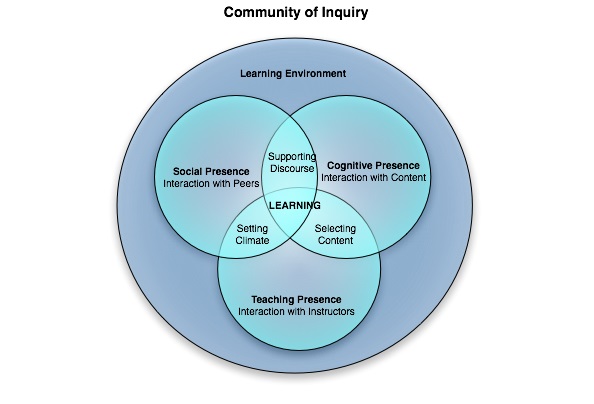UDL Principle 1: Multiple Means of Engagement
This month’s teaching tips from CITL’s UDL Team focus on the first of the three principles that make up the UDL framework: Provide Multiple Means of Engagement. The Center for Applied Special Technology (CAST) explains that because learners differ in the ways they can be engaged and motivated to learn, providing multiple options for engagement is essential.
In Reach Everyone, Teach Everyone, Thomas Tobin maintains that “a UDL approach is about purposely thinking differently about the interactions we create for our courses.” The Community of Inquiry (COI) model shown below offers one useful way of thinking about the various ways learners can interact and engage: with the content (cognitive presence), their instructor (teaching presence), and their peers (social presence).

Figure adapted from R. Garrison, T. Anderson, L. Rourke et al. Community of Inquiry Model (2007)
Providing multiple means of engagement in each of these spheres of discourse stimulates learners’ interests and motivation for learning while also offering them greater opportunities to contribute to the course learning community. Here are a few examples of options for increasing student-content, student-instructor, and student-student engagement.
Student-Content Engagement
- Activate students’ prior knowledge early in each learning module (e.g., by inviting students to relate a concept or topic to current events, their personal experience, or to another concept or topic they learned about previously in the course).
- Provide guides for students’ learning (e.g., key words lists, guiding questions to focus reading, links to items for further study, rubrics, templates, checklists).
- Provide multi-stage projects that allow students to build on their accumulated learning in the course.
- Use low stakes formative assessments and repeatable learning checks with mastery-oriented feedback to help reinforce key concepts and ideas.
Student-Instructor Engagement
- Send a welcome email message and/or video prior to course launch.
- Post regular/weekly announcements that do more than housekeeping by helping learners synthesize information covered, get them excited about what’s coming up in the next unit or week, and highlight exceptionally good work by individual students.
- Maintain a virtual office for live web conferencing or text chat.
- Use the course blog tool as an informal communication channel.
- Provide a Q & A Forum for course-related questions that allow students and the instructor to respond to course content questions.
- Solicit Informal Early Feedback (IEF) on instructional activities.
- Leverage online journals as a reflective student-instructor communication channel.
Student-Student Engagement
- Leverage the online discussion board (instructor-graded and/or peer-reviewed).
- Provide opportunities for collaborative group work (e.g., role playing, case studies, debates, group presentations).
- Use wikis to facilitate collaborative authoring.
- Provide informal discussion areas for students.
These lists are by no means exhaustive, and CITL’s UDL Team would love to hear about, and showcase, strategies you’ve used to increase engagement options in your course. Additionally, if you’re looking to enhance the accessibility and inclusivity of your course and teaching, CITL's Universal Design for Learning (UDL) Team is here to help. You can reach us at CITL-UDLTeam@illinois.edu. Tune in next month when we look at some examples of how information and content can be presented in different ways to provide multiple means of representation, the second principle in the UDL framework.
Selected Resources:
Contact Information
If you’re looking to enhance the accessibility and inclusivity of your course design, CITL's Universal Design for Learning (UDL) Team is here to help! You can reach us at CITL-UDLTeam@illinois.edu.